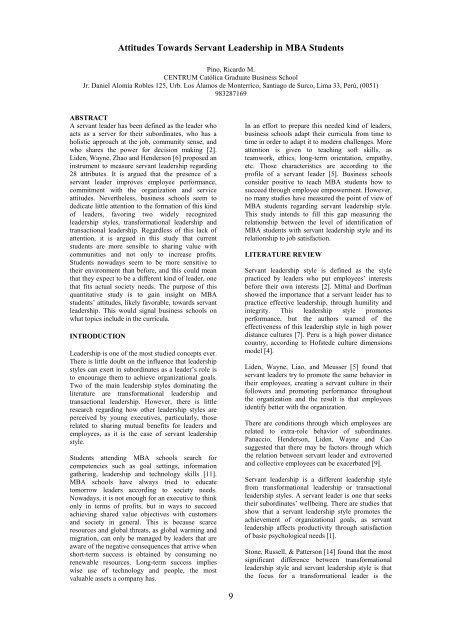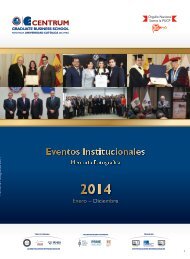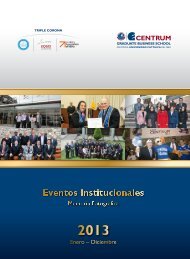Pan-Pacific Conference XXXIV. Designing New Business Models in Developing Economies
This publication represents the Proceedings of the 34th Annual Pan-Pacific Conference being held in Lima, Peru May 29-31, 2017. The Pan-Pacific Conference has served as an important forum for the exchange of ideas and information for promoting understanding and cooperation among the peoples of the world since 1984. Last year, we had a memorable conference in Miri, Malaysia, in cooperation with Curtin University Sarawak, under the theme of “Building a Smart Society through Innovation and Co-creation.” Professor Pauline Ho served as Chair of the Local Organizing Committee, with strong leadership support of Pro Vice-Chancellor Professor Jim Mienczakowski and Dean Jonathan Winterton.
This publication represents the Proceedings of the 34th Annual Pan-Pacific Conference being held in Lima, Peru May 29-31, 2017. The Pan-Pacific Conference has served as an important forum for the exchange of ideas and information for promoting understanding and cooperation among the peoples of the world since 1984. Last year, we had a memorable conference in Miri, Malaysia, in cooperation with Curtin University Sarawak, under the theme of “Building a Smart Society through Innovation and Co-creation.” Professor Pauline Ho served as Chair of the Local Organizing Committee, with strong leadership support of Pro Vice-Chancellor Professor Jim Mienczakowski and Dean Jonathan Winterton.
You also want an ePaper? Increase the reach of your titles
YUMPU automatically turns print PDFs into web optimized ePapers that Google loves.
Attitudes Towards Servant Leadership <strong>in</strong> MBA Students<br />
P<strong>in</strong>o, Ricardo M.<br />
CENTRUM Católica Graduate <strong>Bus<strong>in</strong>ess</strong> School<br />
Jr. Daniel Alomía Robles 125, Urb. Los Álamos de Monterrico, Santiago de Surco, Lima 33, Perú, (0051)<br />
983287169<br />
ABSTRACT<br />
A servant leader has been def<strong>in</strong>ed as the leader who<br />
acts as a server for their subord<strong>in</strong>ates, who has a<br />
holistic approach at the job, community sense, and<br />
who shares the power for decision mak<strong>in</strong>g [2].<br />
Liden, Wayne, Zhao and Henderson [6] proposed an<br />
<strong>in</strong>strument to measure servant leadership regard<strong>in</strong>g<br />
28 attributes. It is argued that the presence of a<br />
servant leader improves employee performance,<br />
commitment with the organization and service<br />
attitudes. Nevertheless, bus<strong>in</strong>ess schools seem to<br />
dedicate little attention to the formation of this k<strong>in</strong>d<br />
of leaders, favor<strong>in</strong>g two widely recognized<br />
leadership styles, transformational leadership and<br />
transactional leadership. Regardless of this lack of<br />
attention, it is argued <strong>in</strong> this study that current<br />
students are more sensible to shar<strong>in</strong>g value with<br />
communities and not only to <strong>in</strong>crease profits.<br />
Students nowadays seem to be more sensitive to<br />
their environment than before, and this could mean<br />
that they expect to be a different k<strong>in</strong>d of leader, one<br />
that fits actual society needs. The purpose of this<br />
quantitative study is to ga<strong>in</strong> <strong>in</strong>sight on MBA<br />
students’ attitudes, likely favorable, towards servant<br />
leadership. This would signal bus<strong>in</strong>ess schools on<br />
what topics <strong>in</strong>clude <strong>in</strong> the curricula.<br />
INTRODUCTION<br />
Leadership is one of the most studied concepts ever.<br />
There is little doubt on the <strong>in</strong>fluence that leadership<br />
styles can exert <strong>in</strong> subord<strong>in</strong>ates as a leader’s role is<br />
to encourage them to achieve organizational goals.<br />
Two of the ma<strong>in</strong> leadership styles dom<strong>in</strong>at<strong>in</strong>g the<br />
literature are transformational leadership and<br />
transactional leadership. However, there is little<br />
research regard<strong>in</strong>g how other leadership styles are<br />
perceived by young executives, particularly, those<br />
related to shar<strong>in</strong>g mutual benefits for leaders and<br />
employees, as it is the case of servant leadership<br />
style.<br />
Students attend<strong>in</strong>g MBA schools search for<br />
competencies such as goal sett<strong>in</strong>gs, <strong>in</strong>formation<br />
gather<strong>in</strong>g, leadership and technology skills [11].<br />
MBA schools have always tried to educate<br />
tomorrow leaders accord<strong>in</strong>g to society needs.<br />
Nowadays, it is not enough for an executive to th<strong>in</strong>k<br />
only <strong>in</strong> terms of profits, but <strong>in</strong> ways to succeed<br />
achiev<strong>in</strong>g shared value objectives with customers<br />
and society <strong>in</strong> general. This is because scarce<br />
resources and global threats, as global warm<strong>in</strong>g and<br />
migration, can only be managed by leaders that are<br />
aware of the negative consequences that arrive when<br />
short-term success is obta<strong>in</strong>ed by consum<strong>in</strong>g no<br />
renewable resources. Long-term success implies<br />
wise use of technology and people, the most<br />
valuable assets a company has.<br />
In an effort to prepare this needed k<strong>in</strong>d of leaders,<br />
bus<strong>in</strong>ess schools adapt their curricula from time to<br />
time <strong>in</strong> order to adapt it to modern challenges. More<br />
attention is given to teach<strong>in</strong>g soft skills, as<br />
teamwork, ethics, long-term orientation, empathy,<br />
etc. Those characteristics are accord<strong>in</strong>g to the<br />
profile of a servant leader [5]. <strong>Bus<strong>in</strong>ess</strong> schools<br />
consider positive to teach MBA students how to<br />
succeed through employee empowerment. However,<br />
no many studies have measured the po<strong>in</strong>t of view of<br />
MBA students regard<strong>in</strong>g servant leadership style.<br />
This study <strong>in</strong>tends to fill this gap measur<strong>in</strong>g the<br />
relationship between the level of identification of<br />
MBA students with servant leadership style and its<br />
relationship to job satisfaction.<br />
LITERATURE REVIEW<br />
Servant leadership style is def<strong>in</strong>ed as the style<br />
practiced by leaders who put employees’ <strong>in</strong>terests<br />
before their own <strong>in</strong>terests [2]. Mittal and Dorfman<br />
showed the importance that a servant leader has to<br />
practice effective leadership, through humility and<br />
<strong>in</strong>tegrity. This leadership style promotes<br />
performance, but the authors warned of the<br />
effectiveness of this leadership style <strong>in</strong> high power<br />
distance cultures [7]. Peru is a high power distance<br />
country, accord<strong>in</strong>g to Hofstede culture dimensions<br />
model [4].<br />
Liden, Wayne, Liao, and Meusser [5] found that<br />
servant leaders try to promote the same behavior <strong>in</strong><br />
their employees, creat<strong>in</strong>g a servant culture <strong>in</strong> their<br />
followers and promot<strong>in</strong>g performance throughout<br />
the organization and the result is that employees<br />
identify better with the organization.<br />
There are conditions through which employees are<br />
related to extra-role behavior of subord<strong>in</strong>ates.<br />
<strong>Pan</strong>accio, Henderson, Liden, Wayne and Cao<br />
suggested that there may be factors through which<br />
the relation between servant leader and extroverted<br />
and collective employees can be exacerbated [9].<br />
Servant leadership is a different leadership style<br />
from transformational leadership or transactional<br />
leadership styles. A servant leader is one that seeks<br />
their subord<strong>in</strong>ates’ wellbe<strong>in</strong>g. There are studies that<br />
show that a servant leadership style promotes the<br />
achievement of organizational goals, as servant<br />
leadership affects productivity through satisfaction<br />
of basic psychological needs [1].<br />
Stone, Russell, & Patterson [14] found that the most<br />
significant difference between transformational<br />
leadership style and servant leadership style is that<br />
the focus for a transformational leader is the<br />
9

















